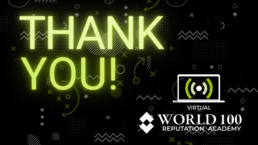Many things have had to adapt during the COVID19 pandemic – a sentence I’m sure we’re all growing a little tired of. But despite that, the fact remains that normality is now so different. This was the case for our Reputation Academy, a key World 100 Reputation Network event that sees the coming together of marketing, communications, and international colleagues across world-leading universities to learn more about how to boost the reputation of their institutions.
This event is normally one of our favorites. Alongside the lessons, usually hosted in-person at the Churchill College in Cambridge, UK, the weeklong training course is usually awash with networking opportunities, group activities, and social events. But not this year.
For 2021, we had to move the Reputation Academy online, an action not without its list of challenges, particularly the time-zone conundrum.

Whilst having members and attendees from all over the globe is a key part of the Network’s DNA, finding a time for them to all be awake, let alone online, together is very tricky.
We settled for splitting delegates into two groups; time zone 1 suitable for Japan, Singapore and Australia and time zone 2 for Europe and The Americas. This meant a 4.30am wake up call for our team; but that’s just something we’ve had to adjust to in the past year. And more positively, having our event online was a good opportunity to reach a broader range of international delegates as the need to fly and accommodation costs were removed.
Secondly, there’s the question of ‘online fatigue’. A weeklong classroom-based experience keeps you mentally and physically engaged; but when you are in the comfort of your own home or office, do attendees really want to watch a screen for long periods of time? To counter this we cut the Academy to three days and offered discussions and breakout groups within sessions as well as separate periods for mentoring and dialogue. This gave the delegates the opportunity to engage and share experiences amongst themselves and to work together on tasks set by our trainers. Our delegates told us how valuable this was but that they would have liked more even discussion opportunities which is something we will incorporate into all our future events.
The real strength of the Academy is the opportunity to learn from leaders in reputation at W100 member universities. Our trainers really shone during the three days, their years of experience showing that they practice what they preach, helping delegates understand processes, benefits and tips.
Sessions covered everything from strategic planning to crisis communications, communicating research to measurement and evaluation. We obviously can’t give you all the insights (Join our next Academy for those – see below) but some key takeaways from our trainers included:
- Developing a reputation strategy to support your university’s overall plan is key to making an impact. Too few university strategic plans specifically reference reputation currently, but that is changing.
- When building your brand, avoid focusing on too many ‘hygiene’ factors such as ‘safe’, ‘attractive campus’ and ‘innovative’; choose ‘differentiators’ such as specific specialisms, examples of impact and facets that your university has that other’s don’t
- Most of us feel we could do a better job with more budgets and staff. Tips for expanding resources include accessing external funding through partners, such as city and regional authorities to get access to resources to promoting the city and the university
- Know who your stakeholders are, who is relevant at which point and how can you tailor your messaging and approach to them
- Have a crisis management plan and a crisis management team to prepare you as well as possible; but all crises are different, and managing the emotions as much as the facts is important
- Ensure you have clear and measurable KPIs to demonstrate your impact
But the biggest takeaway is that networking is still the ultimate draw for events, whether online or face-to-face. Discussion amongst peers and the opportunity to share experiences and insights will always be demanded and of value to delegates of any event. That is why we will prioritize this element in future W100 Network events as part of our 21/22 membership year.
Our next Reputation Academy will be held in November. If you are interested in attending or sending colleagues – or perhaps in becoming a W100 Academy trainer yourself – contact Sarah Thomas, Events and Communications Manager


